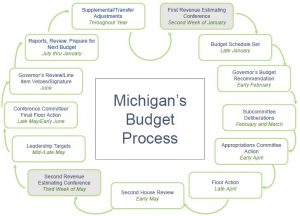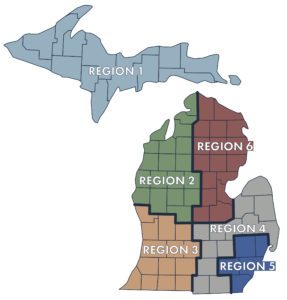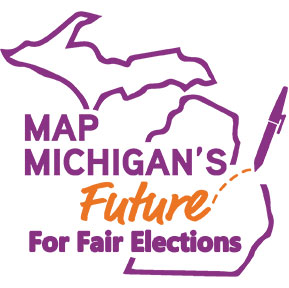Counties, be sure you are set up with Treasury on ARP funds
 The U.S. Department of Treasury released a wave of documents Monday to guide counties and local governments on using direct investment funds through the American Rescue Plan (ARP).
The U.S. Department of Treasury released a wave of documents Monday to guide counties and local governments on using direct investment funds through the American Rescue Plan (ARP).
Michigan counties stand to receive about $1.9 billion in such aid.
Treasury has created a main landing page for this effort, noting that relief is intended to:
- Support urgent COVID-19 response efforts to continue to decrease spread of the virus and bring the pandemic under control
- Replace lost revenue for eligible state, local, territorial, and Tribal governments to strengthen support for vital public services and help retain jobs
- Support immediate economic stabilization for households and businesses
- Address systemic public health and economic challenges that have contributed to the unequal impact of the pandemic
“The Coronavirus State and Local Fiscal Recovery Funds provide substantial flexibility for each government to meet local needs—including support for households, small businesses, impacted industries, essential workers, and the communities hardest hit by the crisis. These funds can also be used to make necessary investments in water, sewer and broadband infrastructure,” Treasury stated.
Treasury has published an Interim Final Rule that implements the provisions of this program.
In addition, Treasury offers a “quick reference” fact sheet and the Michigan House Fiscal Agency has issued its own overview of the American Rescue Plan’s overall provisions.
State budget bills continue their advance in Legislature
 The full House and full Senate this week voted on budget bills for fiscal 2022, with appropriations measures passing largely along party lines and with minimal floor changes.
The full House and full Senate this week voted on budget bills for fiscal 2022, with appropriations measures passing largely along party lines and with minimal floor changes.
Democratic House members did introduce amendments that would restore the 75 percent of funding withheld from various budgets due to the Republicans’ newly adopted approach of quarterly budgeting, but those amendments failed.
Now, the House budget bills go to the Senate, and the Senate bills go to the House. After the two chambers finish this stage, a joint conference committee will take up points of disagreement and offer up final numbers for final approval.
The Senate budget includes $231,516,700 for county revenue sharing, which would be a 2 percent boost from FY21. Additionally, the Senate proposal retains the requirement that any county with a retirement benefit system that was in an underfunded status must dedicate any county revenue sharing increase to that system.
The House provides for a 1 percent increase on revenue sharing, for $226,529,400 to counties. The funds, however, are tied to a requirement that the county must maintain public safety expenditures at an amount not less than FY21 to qualify for a payment.
MAC had asked legislators to eliminate strings attached to county revenue sharing payments. MAC will renew that request when budget bills reach the joint House-Senate conference committee stage.
The Michigan Indigent Defense Commission grants remain recommended at $148.9 million in both chambers; however, the House still moves that line item to the judiciary budget, a change that still raises constitutionality questions involving the separation of powers. Changes to the MIDC Act would have to be made in order to house the commission’s budget under the judiciary.
In other highlights, there is a $5 million increase to local public health under the Senate plan and $4 million in both the House and Senate to fully fund county veteran service fund grants. Please see previous MAC updates for additional budget information and more specific line items.
The Consensus Revenue Estimating Conference (CREC) is scheduled for next Friday. The CREC establishes an official economic forecast and projects revenues that appropriators use in the final stage of the budget process.
MAC opposes bills to alter property record fees
 A bipartisan package of bills aimed at changing the process and fee schedule for accessing and copying records held by county registers of deeds and treasurers was up for testimony this week in the House Commerce and Tourism Committee.
A bipartisan package of bills aimed at changing the process and fee schedule for accessing and copying records held by county registers of deeds and treasurers was up for testimony this week in the House Commerce and Tourism Committee.
House Bills 4729-32, by Reps. John Cherry (D-Genesee), Julie Calley (R-Ionia), Mari Manoogian (D-Oakland) and Steve Marino (R-Macomb), were introduced to try to manage the cost of acquiring requested records. The proponents assert they are being overcharged for access to real estate records or even denied access in some cases because they are only asking for partial information.
The bills would limit the amount a county can charge for these fields of information, allow the requesting party to designate the medium by which they receive the information and allow the requesting party to gain information based on particular fields of information if they do not want the entire file.
MAC is working with the other organizations representing county-wide elected officials affected by this legislation and is currently opposed to the package.
For more information on this issue, contact Deena Bosworth at bosworth@micounties.org.
Supplemental spending bill includes millions for county programs
 The Michigan House this week passed, 65-42, a $3.3 billion supplemental appropriation bill, with $1 billion to be drawn from the state’s General Fund and $2.3 billion from the federal Coronavirus Response and Relief Supplemental Appropriations Act.
The Michigan House this week passed, 65-42, a $3.3 billion supplemental appropriation bill, with $1 billion to be drawn from the state’s General Fund and $2.3 billion from the federal Coronavirus Response and Relief Supplemental Appropriations Act.
Under the spending bill, $5 million would reimburse county jails for housing offenders at county jails who otherwise would have been transferred to correctional facilities if not for state emergency orders.
About $37.5 million is designated for infrastructure grants to address flooding, erosion and other coastal issues, while $2.5 million goes for planning grants to address severe weather impacts and changing climate effects. Also included is $25 million for PFAS remediation grants, $15 million of which must be allocated to municipal airports and independent airport authorities.
The bill applies $100 million to cover a $23 per Medicaid day increase to nursing facilities that have experienced a 5 percent or greater decline in their average daily census. Additionally, $215 million would go to mental health facilities, including $3 million for new psychiatric beds and emergency department needs through McLaren Northern Michigan.
The bill includes $7.5 million to support public access, through a website, to documents and digital images of documents filed in courts. Another $2.7 million would support the Secondary Road Patrol Program, which provides grants to county sheriff departments for the patrol of secondary roads.
Lastly, $150 million is allocated to the Broadband Expansion Act of Michigan, which provides for grants to private internet service providers to support infrastructure-related and other costs associated with expanding broadband internet service to unserved areas of Michigan.
A full summary of the bill can be found here.
MAC still needs your voice on 4-year terms
 While legislation to enact four-year terms for county commissioners awaits action on the Senate floor, MAC again asks members to add their individual and collective voices to the campaign.
While legislation to enact four-year terms for county commissioners awaits action on the Senate floor, MAC again asks members to add their individual and collective voices to the campaign.
Senate Bill 242, by Sen. Ed McBroom (R-Dickinson), and SB 245, by Sen. Jeremy Moss (D-Oakland) would bring four-year terms to Michigan in the 2024 presidential election cycle. Enactment of these bills would end Michigan’s status as one of just five states with two-year terms on all commissioners.
The bills are now on the Senate floor.
MAC continues to encourage commissioners to add their voices to the four-year term effort. As of Friday morning, 68 county leaders had responded. Please add your voice to this effort today by clicking here.
MAC also requests that counties adopt official resolutions of support for the legislation. To download a template for this purpose, click here. If you pass such a resolution, please send a copy to Hannah Sweeney at sweeney@micounties.org.
As of Thursday, the following counties had advised MAC of passage of such resolutions: Allegan, Alpena, Bay, Cheboygan, Clinton, Dickinson, Emmet, Genesee, Houghton, Ionia, Isabella, Manistee, Marquette, Mecosta, Newaygo, Ontonagon, Sanilac, Van Buren, Washtenaw and Wexford.
For more information on this issue, contact Deena Bosworth at bosworth@micounties.org.
MAC asks counties to pass resolutions on revenue sharing shortfalls
 Part of MAC’s 2021 legislative agenda is to gain a one-time payment to compensate dozens of Michigan counties that were shorted proper revenue sharing funds prior to 2015.
Part of MAC’s 2021 legislative agenda is to gain a one-time payment to compensate dozens of Michigan counties that were shorted proper revenue sharing funds prior to 2015.
MAC has done extensive research into county revenue sharing and the impact the County Revenue Sharing Reserve Fund (CRSRF) has had. The research indicates the state has cumulatively shorted 61 counties more than $110 million between 2009 and 2014. We ask that you support an appropriation to restore those funds.
MAC is encouraging counties to add their voices to the one-time payment of the cumulative revenue sharing shortfall by adopting official resolutions of support. Here is a template you can use for this purpose. If you pass such a resolution, please send a copy to Hannah Sweeney at sweeney@micounties.org.
As of Thursday, the following counties had advised MAC of passage of such resolutions: Alpena, Dickinson, Huron, Livingston, Mecosta, Menominee and Wexford.
For more information on this issue, contact Deena Bosworth at bosworth@micounties.org.
Videos from 2021 Legislative Conference are now available
 MAC members can view hours of recordings packed with information on key county topics recently presented at the 2021 Michigan Counties Legislative Conference.
MAC members can view hours of recordings packed with information on key county topics recently presented at the 2021 Michigan Counties Legislative Conference.
The conference was held virtually due to pandemic restrictions on gatherings in late April.
In addition to recordings, members can review slides presented on topics ranging from how to leverage federal aid to threats to Michigan’s groundwater and screen shots captured during conference events.
MAC plans to return to in-person gatherings in late July with the Regional Summit series of single-day “mini conferences” at four locations around the state. Look for dates, locations and registration information for these events in late May or early June.
And planning is under way for the 2021 Annual Conference, to be held Sept. 26-28 at the Grand Hotel on Mackinac Island.
For the latest conference information, visit MAC’s conferences page.
 Podcast 83 resumes live sessions on Monday, May 17
Podcast 83 resumes live sessions on Monday, May 17
After a one-week hiatus, MAC’s Podcast 83 team returns to the web on Monday, May 17 to discuss legislative action in Lansing and Washington, D.C.
To register for the live event, which starts at 3 p.m., click here.
Links to past episodes can be found on the podcast webpage, while every 2021 video episode is now available on MAC’s YouTube channel.
Candidate filing period opens for MAC Board elections in September
 At the 2021 Michigan Counties Annual Conference (Sept. 26-28 on Mackinac Island), MAC members will vote on five seats on the MAC Board of Directors. Commissioners wishing to serve on the Board, whether incumbents or new candidates, have until Aug. 26 to file official notice of their intent to run. (The application form is found here.)
At the 2021 Michigan Counties Annual Conference (Sept. 26-28 on Mackinac Island), MAC members will vote on five seats on the MAC Board of Directors. Commissioners wishing to serve on the Board, whether incumbents or new candidates, have until Aug. 26 to file official notice of their intent to run. (The application form is found here.)
Seats representing regions are filled by a vote in regional caucuses at the conference. At-large seats are filled by the candidate that wins a majority of the six regional caucuses.
The MAC Board of Directors is the key body in guiding the legislative and organizational strategies of MAC. Board terms are three years in length and individuals may serve up to three terms.
2021 Board seats
- Region 1 – 1 seat
- Region 2 – 1 seat
- Region 3 – 1 seat
- Region 5 – 1 seat
- At-large — 1 seat
Any member wishing to run in the election must download the application form and return it by Aug. 26, 2021, at 5 p.m. to be eligible. Candidates are also encouraged to submit a statement of up to 400 words on why members should support them. These statements will be posted to the MAC website in late August.
If you have any questions about Board duties, please contact Executive Director Stephan W. Currie at 517-372-5374.
Many Michiganians are struggling, wellness webinar attendees told
 Roughly 75 percent of those who participated in a recent survey in Michigan said they were somewhat or very lonely.
Roughly 75 percent of those who participated in a recent survey in Michigan said they were somewhat or very lonely.
That and other results on the state of “wellness” in Michigan were presented and discussed during a special MAC webinar on May 11 led by Louis Alloro of The Wellbeing Lab.
This spring, researchers at The Wellbeing Lab headed out into Michigan to measure the well-being of 1,500 people representative of the state. The survey revealed that while 13 percent reported they are really struggling, 10% are consistently thriving and 41.7% are living well, despite struggles.
MAC members may be interested in measuring their well-being using the PERMAH Wellbeing Survey. Individuals can access for free and communities can benefit from the aggregate data (for a small fee) at www.permahsurvey.com.
Alloro also can advise counties on setting up a well-being coalition as was done in Midland County. Contact him at 917-331-0785 or louis@thewellbeinglab.com for more information.
Redistricting Commission continues public hearings for May, June
 The Michigan Independent Citizens Redistricting Commission (MICRC) is continuing its first series of public hearings for its work to redraw political lines for the 2022 elections.
The Michigan Independent Citizens Redistricting Commission (MICRC) is continuing its first series of public hearings for its work to redraw political lines for the 2022 elections.
The public hearings will run from 5 p.m. to 9 p.m. and are currently set for virtual sessions, though that is subject to change as the pandemic health orders change. Locations and dates are:
- May 18 – Marquette
- May 20 – Gaylord
- May 25 – Midland
- May 27 – Lansing
- June 1 – Flint
- June 3 – Pontiac
- June 8 – Novi
- June 10 – Dearborn
- June 15 & 17 – Detroit
- June 22 – Port Huron
- June 24 – Warren
- June 29 – Muskegon
- July 1 – Grand Rapids
Please note, the Independent Redistricting Commission will draw district lines for state legislative and federal congressional districts. The lines for county commissioner districts are handled by county Apportionment Boards. For details on the apportionment process, click here or view a recording of a 2021 Legislative Conference workshop on the process.
Free course to focus on ‘Dynamics of Addiction’
 A May 27 webinar on substance abuse disorders will cover the basics on Substance Use Disorder (SUD) and provide participants with knowledge, skills and strategies to manage SUD-related situations as an emergency responder. Development and funding for this course is courtesy of the Michigan Department of Health and Human Services.
A May 27 webinar on substance abuse disorders will cover the basics on Substance Use Disorder (SUD) and provide participants with knowledge, skills and strategies to manage SUD-related situations as an emergency responder. Development and funding for this course is courtesy of the Michigan Department of Health and Human Services.
The free session will run from 10 a.m. to noon and is part of the “Managing Mental Health Crisis” series that is designed specifically for Michigan law enforcement, public safety and community mental health responders. Such sessions are endorsed by the State of Michigan’s Diversion Council, MCOLES-approved and meet with MCOLES-recommended annual officer trainings.
To register, click here. Seats are limited to 47 participants. Deadline to register is May 26.
For information, contact J. Eric Waddell at jericwaddell@thecardinalgroup2.com.
Staff pic ks
ks
- Storefront stagnation: Coping with neighborhood retail’s new realities (Governing)
- Michigan courts planning for systemic reform (WDET)
- Michigan redistricting: Making public hearings fair and effective (video) (University of Michigan Ford School)
- Paying with cash? Retailers must take your dollars in these states. (Stateline)
